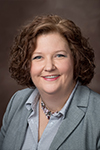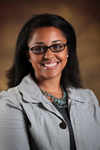UHV school psychologist alumni help students succeed in life
Shameka Davis is someone who likes to see children succeed, especially children whose path to success may not look like the same road as their peers. As a licensed specialist in school psychology at Alief Independent School District in Houston, the University of Houston-Victoria alumna makes sure that children receive adequate support.
“With patience and possibly more time, every student can obtain success,” Davis said. “Every child can learn; it may just look a little different for each kid, and that’s OK. I enjoy working with students and their families to help them reach their maximum potential.”
Davis is one of many alumni in the state who graduated from the UHV Specialist in School Psychology program. The training students receive in the program is consistent with the standards of the Texas State Board of Examiners of Psychology Licensed Specialist in School Psychology credentialing, which complies with the nationally recognized standards for the practice of school psychology that are outlined by the National Association of School Psychologists standards.
“We appreciate all the work our alumni do to help build strong and successful communities,” said Beverly Tomek, interim dean of the UHV School of Arts & Sciences. “National School Psychology Week is an opportunity to recognize the key role school psychologists play in the development of children.”
School psychologists work with children to help them succeed in and out of the classroom, said Elise Hendricker, an associate professor of school psychology and the chair of the social and behavioral sciences division at UHV. Youth with special emotional, behavioral or learning needs will often work with a school psychologist, as well as students who need additional mental health support.
“School psychologists not only work with students but also help the students’ parents and teachers to make sure that the students can receive the tools they need in order to be successful,” Hendricker said. “Families can always lean on the school psychologist to help with behavioral or academic challenges the students may have.”
Davis graduated from the program in May and received a Bachelor of Science in psychology in 2012 from the University of Houston-Downtown. She also is an adjunct lecturer at UHV, where she teaches “Child and Adolescent Development.” Since 2008, she has worked with special education students with severe developmental and cognitive delays and has always been interested in how she could better support her students. After working as a paraprofessional and special education teacher, she decided to become a licensed specialist in school psychology. Through UHV’s program, she was able to learn about the different developmental variables of children in special populations, such as children on the Autism spectrum.
“I’ve learned how to look at the whole child and see what their needs are,” Davis said. “It’s about meeting the child where they are and making sure they have a fair playing field. Parents need that support as well, and we are also here for them.”
Often, school psychologists work with teachers if they have a student in the classroom with behavioral issues, Hendricker said.
That’s part of Meghan Johnson’s role at Pasadena Independent School District in Pasadena, a town southeast of Houston. Johnson graduated in May 2019 from the UHV Specialist in School Psychology program and works as a licensed specialist in school psychology with the district. She received her Bachelor of Science in psychology in 2012 from Texas State University. She also has a Master of Arts in psychology from the University of Houston-Clear Lake.
“Through the program at UHV, I was able to get a good idea of what to expect in the classroom with students,” Johnson said. “Therapy outside of school looks different than therapy a child would receive in a school setting because we are helping the child to be academically and socially successful, too.”
One of her main duties is evaluating students for the special education program and helping parents of children in the program. She also consults with teachers about strategies they can apply in the classroom to help children with special needs. Johnson also works with students in a regional school for the auditory impaired and hard of hearing.
Because schools have had to switch to virtual learning because of the pandemic, Johnson has met with teachers and parents about how to best help students through digital learning. Some students may have behavioral issues, such as throwing objects, and Johnson will work with the student, parents and teacher to find out the cause of the action.
“We are big collaborators,” she said. “We have to be fluid and problem solvers, so that our students have less problems learning so they can be successful.”
The UHV Specialist in School Psychology program is one of the few programs of its kind in Texas because the flexible online schedule allows students to continue working while being in school. More than half of the classes in the program are online so that students can work and study on their own time, Hendricker said. The faculty teaching the program also all have had extensive experience of working in schools with children, including Hendricker.
“Many of our students already work in a school and want to make a bigger impact with the students they teach every day,” Hendricker said.
To learn more about the UHV Specialist in School Psychology program, contact Hendricker at hendrickere@uhv.edu.
The University of Houston-Victoria, located in the heart of the Coastal Bend region since 1973 in Victoria, Texas, offers courses leading to more than 80 academic programs in the schools of Arts & Sciences; Business Administration; and Education, Health Professions & Human Development. UHV provides face-to-face classes at its Victoria campus, as well as an instructional site in Katy, Texas, and online classes that students can take from anywhere. UHV supports the American Association of State Colleges and Universities Opportunities for All initiative to increase awareness about state colleges and universities and the important role they have in providing a high-quality and accessible education to an increasingly diverse student population, as well as contributing to regional and state economic development.
Amber Aldaco
361-570-4296








